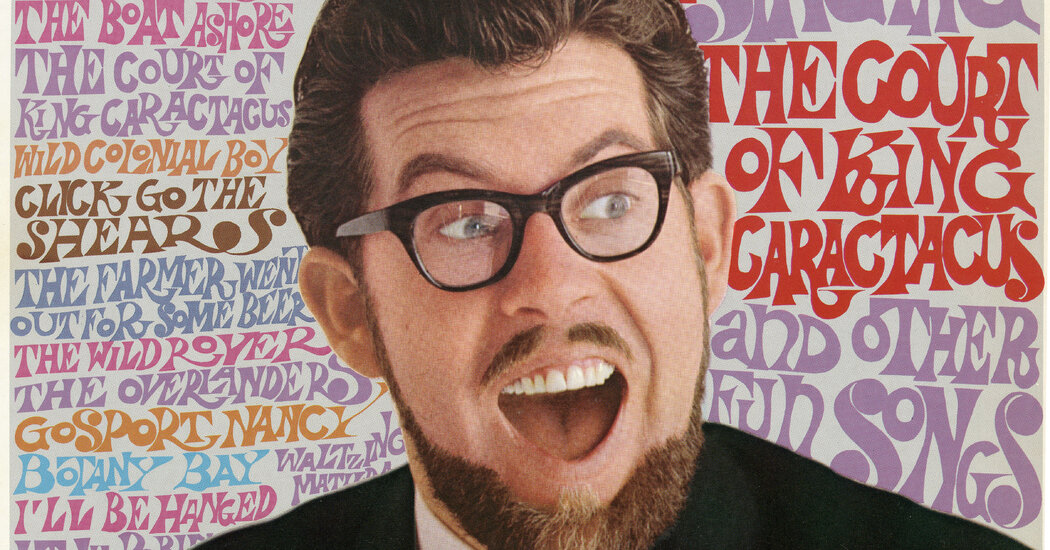Rolf Harris, the Australian-born entertainer whose decades-long career on British television ended in disgrace after he was convicted of sexually abusing teenage girls, died on May 10 at his home in Berkshire, England. He was 93.
His family announced the death in a statement released on Tuesday. The PA news agency reported that a death certificate gave the cause as neck cancer and “frailty of old age.”
Mr. Harris’s career on British television spanned 60 years, but it collapsed in 2013 when he was arrested and charged with a total of 12 attacks on four young girls from 1968 to 1986. He was later sentenced to five years and nine months in prison. At the time of the offenses, the girls ranged in age from 8 to 19, although his conviction for the assault on the 8-year-old girl, an autograph hunter, was later overturned.
One of Mr. Harris’s victims was a close friend of his own daughter, Bindi. He was convicted of abusing the girl over the course of six years, beginning when she was 13.
“Your reputation lies in ruins, you have been stripped of your honors, but you have no one to blame but yourself,” Judge Nigel Sweeney told Mr. Harris at his sentencing in 2014.
“You have shown no remorse for your crimes at all,” he added.
Mr. Harris died without apologizing to his victims.
The son of Welsh immigrants, Agnes Margaret and Cromwell Harris, Mr. Harris was born on March 30, 1930, in a suburb of Perth, Australia. He moved to Britain when he was 22 — with, he later said, “nothing but a load of self-confidence” — to study at the City and Guilds of London Art School. He made his first appearance on the BBC in 1953, drawing cartoons on a children’s television show.
That kicked off a storied career that included everything from international hit songs to lighthearted television shows on which he would demonstrate his skills as a quick-fire painter (think Britain’s version of Bob Ross).
“Can you tell what it is yet?” became his famous catchphrase as he brought the canvases to life. It also became the title of his autobiography, published in 2001.
One of Britain’s best-known artists, Mr. Harris was even commissioned in 2005 to paint a portrait of Queen Elizabeth II for her 80th birthday — the whereabouts of which remains a great source of mystery. It was previously voted the British public’s second-favorite portrait of the queen, but it received a notably colder reception from critics.
“I was as nervous as anything,” Mr. Harris told the British press in 2008, describing the two sittings he had with the monarch. “I was in a panic.”
As a musician, he was known for his use of a colorful array of instruments, including the didgeridoo and the so-called wobble board — an instrument he invented. He featured it in his best-known song, “Tie Me Kangaroo Down, Sport,” a novelty number about an Australian stockman’s dying wishes, which he wrote in 1957.
His 1963 rerecording of the song, which reached No. 3 on the Billboard Hot 100 singles chart, catapulted him to stardom in the United States. That same year, he recorded a version with the Beatles for a BBC radio show — the names of each band member playfully incorporated into the lyrics. (“Don’t ill-treat me pet dingo, Ringo.”)
The song’s original fourth verse courted controversy because of its use of the word “Abo,” a derogatory slang term for Aboriginal Australians. The verse was included on Mr. Harris’s first recording of the song but omitted from later versions, and he later expressed regret about the lyrics.
His career ultimately ended in disgrace a decade ago when he was one of several older media personalities arrested as part of Operation Yewtree, a British police investigation arising from the sexual abuse scandal involving the television presenter Jimmy Savile. Among the others convicted as part of the investigation were Britain’s best-known publicist, Max Clifford, and Stuart Hall, a former BBC broadcaster.
After Mr. Harris was convicted in 2014, he was stripped of the honors he had been awarded throughout his career, and reruns of his television shows were taken off the air.
He was released on parole in 2017 after serving three years in prison, after which he sank into a reclusive life at his family home in Bray, Berkshire, a quaint village west of London on the banks of the River Thames. Bray is said to have more millionaires than any small town in Britain.
Mr. Harris’s survivors include his daughter, Bindi Harris, and his wife, Alwen Hughes. The two married in 1958 after meeting in art school, and she and his daughter stuck with him throughout his trial and prison term.
After Mr. Harris’s sentencing in 2014, Judge Sweeney depicted him as an offender who had manipulated his fame.
“You took advantage of the trust placed in you because of your celebrity status,” he said.
Mr. Harris’s lawyer at the time, Sonia Woodley, pleaded with the judge to be lenient because of his age.
“He is already on borrowed time,” she said.

Tinggalkan Balasan